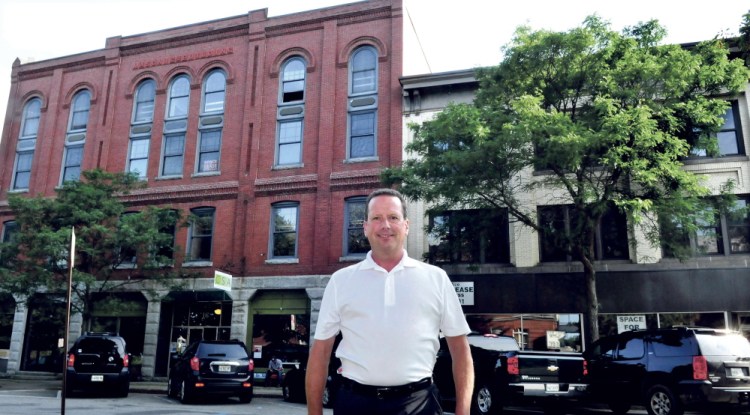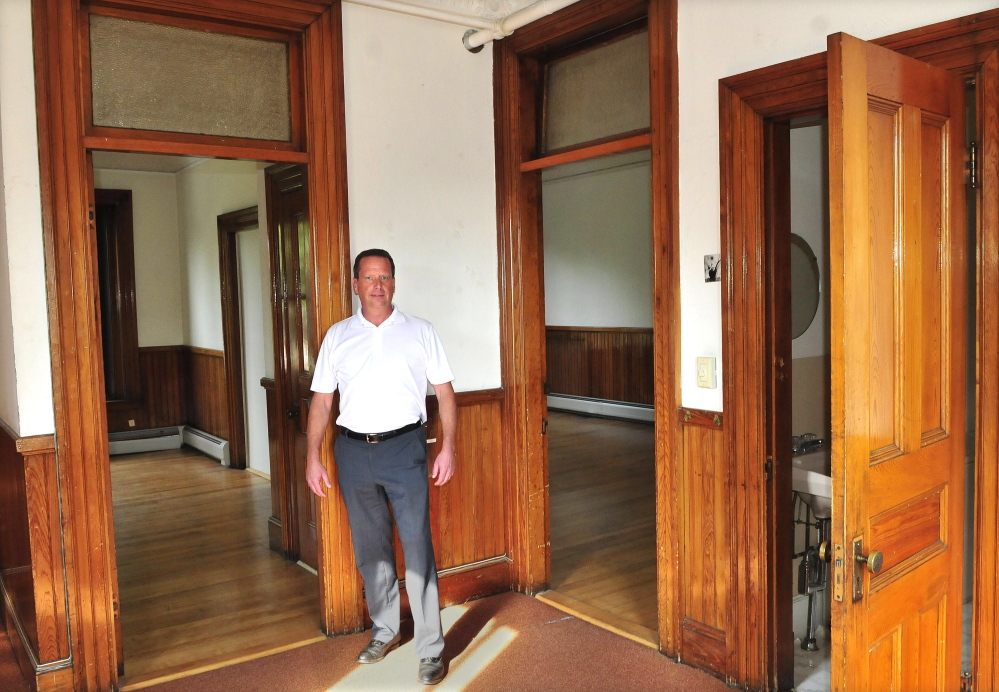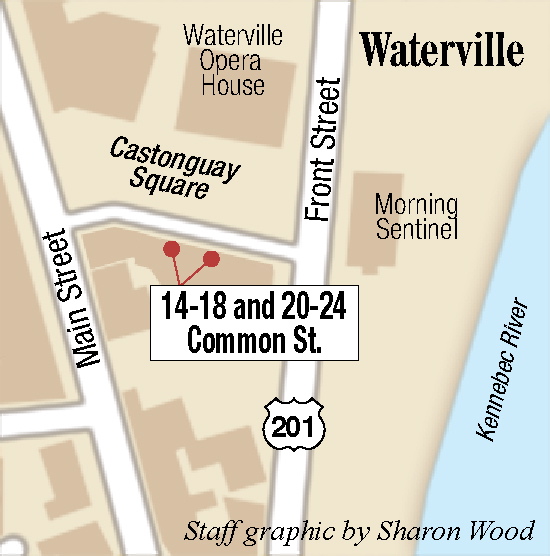WATERVILLE — Longtime businessman Bill Mitchell has bought two historic buildings on Common Street downtown and is negotiating with a restaurateur to lease space in one of them.
Mitchell, owner of GHM Insurance Agency on nearby Main Street, bought the Masonic Building at 14-18 Common St., which houses Common Street Arts, a gallery and studio, as well as a photographer and other artists. He also bought the vacant building to the right of it, 20-24 Common St.
Mitchell hopes to lease space in the buildings to artists and other art-related ventures and develop rooms for professional offices.
Both buildings were at one time owned by Michael Nawfel, who practiced dentistry in one and leased space to offices. The buildings were later sold, fell into disrepair and were taken over by the bank.
“My hope is to bring these buildings back to the way that Dr. Nawfel ran them,” Mitchell said. “The Masonic Building is a beautiful building. It’s probably one of the nicer buildings downtown and looks over Castonguay Square.”
He said Nawfel “took very good care of them and took a lot of pride in his buildings and made them look very attractive.”
Mitchell is negotiating with Jobi Culver, who previously owned and operated the Bread Box on Main Street, for a wood-fired brick oven restaurant on the first floor of the four-story Masonic Building.
“Jobi hopes to open his new restaurant in early December,” Mitchell said.
Mitchell’s plans for rehabilitating the buildings coincide with a concerted effort by city leaders, business people, Colby College and downtown organizations to revitalize downtown and make it a center and destination for arts and culture and spur economic development.
Those people were part of a special committee headed up by Colby President David Greene, and Mitchell was a member of that committee.
Colby bought two vacant downtown buildings that have fallen into disrepair, the Hains building at 173 Main St. and the former Levine’s clothing store building at 9 Main St. The college also is under contract to buy 16-20 Main St., a building that formerly housed a tattoo parlor and apartments and was the site of a fire in 2013 that rendered it uninhabitable.
Colby officials say they don’t have specific plans for the three buildings but have discussed putting a hotel, retail businesses, living spaces and other types of businesses downtown.
INVESTMENT PAYS OFF
Jennifer Olsen, executive director of Waterville Main Street, also was a committee member and said the panel hoped that Colby’s investment in downtown would leverage further investment, and that is precisely what Mitchell has done.
She said Mitchell “has now chosen to step up to preserve (a) historic building that, frankly, is very important to our downtown’s look and feel,” Olsen said Wednesday.
Colby was right to pull in local leaders to meet and discuss what the community needed and how it would receive the information, she said.
“I think that this is a very important moment for Waterville, and personally and professionally I’m grateful to be part of this process. And there will be lots of opportunities for growth for longtime residents as well as for those who might choose to locate here. It’s a good day.”
Kimberly Lindlof, president of the Mid-Maine Chamber of Commerce, also was on the committee. Lindlof said Wednesday that Mitchell always has been a proponent of the city and has made investments in real estate properties here.
“We’re pleased to have Billy’s continued investment in Waterville and his renewed focus on investing in downtown properties,” Lindlof said. “It’s only going to add to the revitalization the city is leading with investment from Colby and other downtown developers. It’s wonderful to see so much economic development activity happening and so many developers and people engaged in creating a renewed vibrancy in Waterville. It’s fantastic.”
On Tuesday night, the City Council approved the sale of another vacant downtown building at 10 Temple Court to three artists, Cheryl Cayer, Janis Lazarian and Frank Della Famina, who plan to develop studios and living space there. The building once served as storage for the former Al Corey Music store.
INVESTING IN WATERVILLE
This is not the first time Mitchell has developed vacant, deteriorating properties.
Three years ago he bought a property on Kennedy Memorial Drive and created Penny Hill Park, a mall that he leases to several entities including Goodwill Industries, Mix 107.9 radio, First Choice Pregnancy Resource Center, Edward Jones and Waterville Women’s Care.
He also developed KMD Plaza farther east on the road that’s a gateway into the city. That plaza houses Dairy Queen, Verizon Wireless, Papa John’s Pizza, Enterprise Rent-A-Car, Sam’s Italian Restaurant, Lacey & Company Spa, Beltone Hearing, Retail Therapy and Armed Forces Recruiting Center.
“What I’ve really enjoyed is acquiring properties sort of distressed that need a little bit of reinvigorating and bring them back to maximize their potential,” Mitchell said. “It’s gone really well, and I’ve been fortunate to be part of the redevelopment of properties in Waterville to help stimulate activity and bring new business to the area and create jobs.”
He said he looks forward to bringing the Common Street buildings back to full potential.
“I’m very excited to be redeveloping these buildings. I plan to do quite a lot of work to bring them back to the way they were.”
He said immediate work involves getting the elevator functioning “in the next couple of days.”
He also said that the buildings will be cleaned and made “more presentable and suitable for tenants.”
Waterville Mayor Nick Isgro praised Mitchell’s efforts.
“This is just another sign that the tide is turning in Waterville, and I think that for a pillar in the community like Bill Mitchell to step forward with new investments like this puts a lot of credibility to that notion, so I’m very pleased,” he said.
The Masonic Building was designed in 1890 by architect E.E. Lewis, of Gardiner, and the Masons moved into it on March 23, 1891, according to Waterville Main Street’s website.
The building is in Romanesque Revival style, including arched windows on the fourth floor, terra cotta panels with a rosette in the center and granite piers that surround the ground floor storefronts, the site says.
Waterville Trust and Safe Deposit Co. and C.G. Carleton Esq. auctioneer occupied the ground floor after the building was built and offices were on the third and fourth floors.
Mitchell said a special feature of the building was that the right bay originally was a passageway through which horse-drawn carriages would pass and drop passengers off to go inside. The area was enclosed in 1984 and became the elevator shaft, which provided handicapped accessibility.
Amy Calder — 861-9247
Twitter: @AmyCalder17
Send questions/comments to the editors.






Comments are no longer available on this story